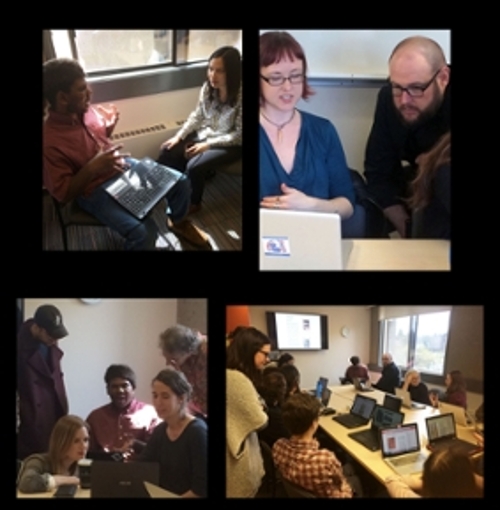Online Collaborative Special Collections Digital Exhibit Launched by Graduate Students
A digital exhibit, featuring many rare items from UViic's Special Collections, was launched this week by the English Department's graduate program. The exhibit, Movable Type: Print Material in Special Collections, was initiated as part of the program's Research Methods course (English 500) last Fall, and features twenty-six entries under the categories "The Book" and "Authorship."
Students began the project by learning the Omeka digital exhibit building platform, including Dublin Core Metadata Standards, and then chose their material from Special Collections with the assistance of their instructor, Dr. Alison Chapman, and Lara Wilson (the Director of Special Collections and University Archivist). Dr. Matt Huculak (Postdoctoral Fellow) and Lisa Goddard (Associate Librarian for digital scholarship) provided technical assistance, and Dr. Adrienne Williams Boyarin gave specialist advice about the medieval and early modern material.
At the launch, graduates provided demos of their work on Omeka to librarians, faculty, and other students, on material as diverse as The Statutes of the Order of the Garter (1553), nineteenth-century magazines such as Bentley's Magazine and Woman's World, Bridges' 1918 edition of Gerard Manley Hopkins' Poems, Robert Sward's annotations to his copies of Sartre's Existentialism, Ethel Wilson's Swamp Angel (1954), Frieda Hughes' marginal pen and ink illustrations in a copy of Sylvia Plath's Bell Jar (1963), and the late-twentieth century anarchist magazine Kick it Over.
Movable Type represents one of the first collaborative graduate student digital exhibits of special collections based research. The students present their material through a mixture of literary, historical, cultural, and theoretical analysis, alongside illustrations and other visual material, and each contribution positions the texts in relation to their Special Collections context, as well as key issues in textual studies such as remediation, print networks, the materiality of the book, and the cultural construction of authorship.
The project continues the ongoing collaboration between the English Department and the Library, and new graduate students arriving in September 2017 will have the opportunity to contribute to expanding the digital exhibit.

